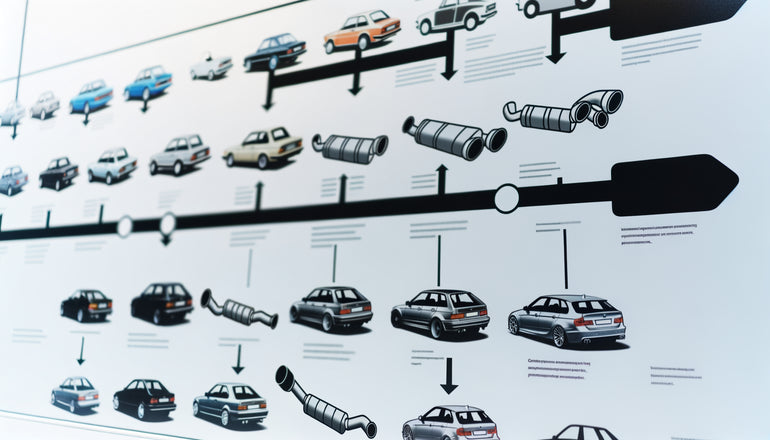Early car exhausts focused on reducing noise and pollution, evolving over time with advancements like high-flow mufflers, resonators, and catalytic converters. Legislation prompted car companies to develop exhaust systems that emitted fewer pollutants.
The use of durable materials such as stainless steel and titanium became common to enhance longevity and performance.
Future exhaust systems are expected to incorporate lighter materials and innovative designs to improve airflow and enhance vehicle power. This progression highlights a shift towards creating eco-friendly and high-performing exhaust systems, moving beyond mere noise reduction.
Key Takeaways
- High-flow mufflers enhance engine power by facilitating easy exhaust gas flow.
- Titanium materials are used to make exhaust systems lighter and improve car performance.
- Computer-aided design ensures smooth exhaust flow for increased speed in performance cars.
- Advanced catalytic converters help performance cars meet strict air pollution regulations.
- Customizable exhaust systems enhance the driving experience for performance car enthusiasts.
Early Exhaust System Innovations
In 1896, Milton Reeves made a big change in cars by creating the first exhaust system. This system helped make cars quieter and less harmful by reducing engine noise and dangerous fumes.
Then, a smart inventor named Eugène Houdry came up with the catalytic converter, which made cars even cleaner by cutting down on bad pollutants. By 1975, governments all around the world were saying that cars had to have these pollution control devices like catalytic converters to help keep the air clean.
These early changes to the exhaust system didn't just make cars quieter — they also made them run better and pollute less, helping the environment. These improvements were just the beginning, leading to even better exhaust systems in performance cars that keep our air much cleaner today.
Development of Performance Components
High-performance exhaust systems in cars are built to make engines work better and meet emission rules. Here's a quick look at some special parts they use:
- High-flow mufflers: These help the engine's exhaust gases flow out more easily, boosting engine power and giving the car a cool sound.
- Resonators: These cut down on noise from the exhaust, making the car sound smoother without losing power.
- Titanium materials: Titanium is both light and strong, so it helps make the car lighter which can improve performance while keeping it sturdy.
- Performance catalytic converters: These important parts reduce pollution from the car while making sure it doesn't lose any power.
- Exhaust headers: They help the exhaust gases flow better from the engine, which makes the car more efficient and powerful.
Impact of Emission Control Regulations
With new rules in place around the world, car companies have to keep improving their exhaust systems to cut down on bad emissions like nitrogen oxide (NOx).
These rules help make the air cleaner by making sure cars pollute less. Cars now use cool tech like catalytic converters, particulate filters, and systems called selective catalytic reduction to make harmful gases less dangerous before they escape into the air.
Thanks to these smart tools, cars made in 2021 release way fewer pollutants than older cars. This shows that the new rules are working well to protect our environment. Car companies keep working on better exhaust tech to make sure cars are greener and don't harm our planet as much.
Advancements in Exhaust System Materials
Advances in materials used for car exhaust systems have made a big impact on sports cars, making them more durable and efficient. Stainless steel is very popular because it doesn't rust and can handle high temperatures well.
Titanium is becoming more common too; it's really light, which helps the car perform better. Another good choice is aluminized steel, which is tough, lighter than regular steel, and fights off rust effectively.
These improvements in materials like stainless steel and titanium help make exhaust systems lighter and stronger. This is great for high-performance sports cars because it means they can go faster and last longer.
Using advanced materials such as titanium not only cuts down on weight but also boosts how well the exhaust system works. This shows how committed the car industry is to innovating and meeting the needs of car lovers who want the best performance.
Role of Technology in Future Designs
The way we make exhaust systems in fast cars is getting better thanks to new materials and cool tech. We're using stuff like titanium, which is super strong but light, helping cars perform better because they're not as heavy.
Also, designing these systems with computer programs helps make sure the exhaust flows smoothly, making the car faster and more powerful.
Plus, new catalytic converters are making cars meet tough air pollution rules while also helping the engine work better. This means cars aren't only cleaner but also run more smoothly. And guess what? You can even customize how your car's exhaust sounds and works, making your driving experience even more fun.
Frequently Asked Questions
How Does the Exhaust System Affect Car Performance?
The exhaust system is important for a car's performance. It helps the engine run better by controlling pressure and noise with a muffler. It also matters for the environment and how the car is designed.
Does Changing Exhaust Change Performance?
Yes, changing your exhaust can improve your car's performance. It can make your car more powerful and change how it sounds. Different materials used in the exhaust system can also make your car run better.
What Exhaust System Adds the Most Horsepower?
To get more horsepower from an exhaust system, pick one that has been tested to show it really works, boosts performance, and sounds good. Make sure to research well to find the best one.
What Exhaust Makes Your Car Faster?
To make your car faster, improve the exhaust system and muffler. This can help your engine run better and make your car speed up faster.





